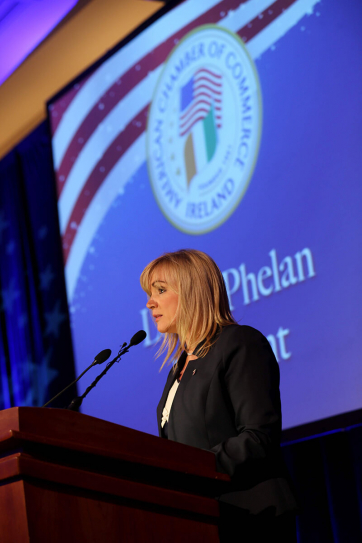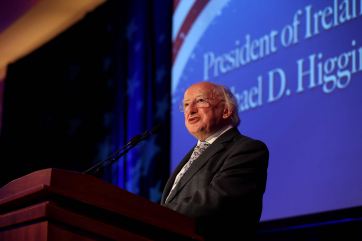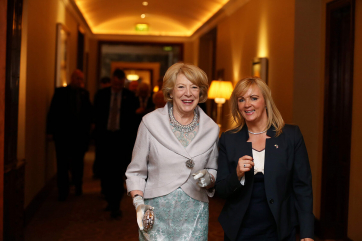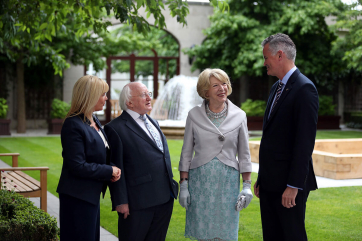Speech at American Chamber of Commerce 2014 Independence Day Lunch
Published: Wed 9 Jul, 2014 | 16:46
Speech by President Michael D.Higgins
at the American Chamber of Commerce 2014 Independence Day Lunch
Four Seasons Hotel, Dublin
Friday, 4th July 2014
A dhaoine uaisle, a chairde,
Tá an-áthas orm bheith anseo libh inniu,
Mar Uachtarán na hÉireann, as President of Ireland, it gives me special pleasure to be here with you today to mark the Independence Day of the United States of America – a nation with which the Irish people have such a warm and close relationship, that stretches back before July 4th 1776 when the Declaration of Independence from Great Britain was proclaimed. The nineteenth century would see several waves of Irish arrive in the United States, particularly after the Great Famine of the mid-century. Today our relationship is built on dense economic and trade ties, which contribute in very significant ways to the material prosperity of this island. More profoundly, it draws on those powerful historical, social, cultural and political connections which have anchored a distinct affinity between our two peoples.
Ireland and the U.S. are bound together by a meeting of hearts and minds, of seeking independence, of migration, for so many of our Irish to cross the Atlantic, a long history of welcome and support, and a rich profusion of personal connections.
I was reminded of the closeness of this bond last May, when I visited Chicago and Indiana and had the opportunity to meet with members of the Irish community, as well as with Mayor Emmanuel, Governor Quinn and other political and business leaders in Chicago.
During that visit, I had the honour of delivering the commencement address at the graduation ceremony at Indiana University, Bloomington. It was a very moving moment for me personally, because my first experience of the United States was in my early twenties, as a Masters student and graduate teaching assistant at Indiana University in the 1960s. That time I spent in the American Midwest was a formative experience in every sense of the word: it influenced my subsequent teaching and writing, my outlook on the world, and my work as an academic and a politician in a most fundamental way.
During my time in Bloomington, as a student and, a decade later, as a young university teacher at Southern Illinois University in Carbondale, I was the recipient of countless acts of hospitality as people invited me to their home for lunch or dinner – an unusual Irish student seeking to combine literature with the social sciences, and whose Western Irish accent was an object of fascination. More often than not, on those evenings with homemade ice-cream on the porch, the music of Willie Nelson would be playing in the background. These gestures of openness and generosity toward a young stranger, together with that warmth, directness and candour which are the hallmarks of ‘the North American way’, made a deep impression on me at the time. They represent for me a precious version of the United States of America, and I am glad to say that my recent visit confirmed that the people of Indiana and Chicago have lost none of their wonderful qualities of hospitality.
My experience mirrors that of so many Irish who, before and since, have been drawn to the United States – some of them in pursuit of employment opportunities and the promise of a better future; others animated by a thirst for knowledge and education, or simply by a desire to broaden their horizons or try their fortunes abroad.
The interpersonal connections forged during these journeys across the Atlantic Ocean provide the lifeblood for the enduring strength of the bilateral relationship between our two countries.
As a nation we remain very conscious of the enormous debt of gratitude we owe to the U.S., to the welcome and the opportunities your country has offered to those who have left Ireland’s shores over the years, and who have responded with their own creativity and contributions. Irish-Americans have made their mark in every facet of American society: in politics and in the public service; in business and industry; in academia and sports; in the media and in the creative arts.
The contribution is there in American literature, from Eugene O’Neill, who is so clearly part of the Irish canon in theatre, to Cormac McCarthy or Colum McCann. It is there in American music: country, bluegrass, Appalachian folk music, blues – all bear Irish influences and they have influenced contemporary Irish music and dance.
In turn, the impact of the American experience on Irish culture and society has been profound and lasting; the very act of emigration itself forcing a remaking, a reimagining of the self, which breathes new life into inherited conceptions and practices. Irish America has been an incubator for novel ideas, influences and know-how that have greatly enriched our vernacular imaginations.
As a very practical and much valued expression of the friendship between our two nations, may I also, this afternoon, pay tribute to the US government’s deep commitment to the peace process on this island and their continuing support for the Good Friday Agreement.
There were many actors in the Northern Ireland peace process, but among the most influential were the successive U.S. administrations and leaders on Capitol Hill, on both sides of the aisle, the American Congress and the wider Irish-American community. All of them have, at critical times in what was a long and difficult process, have steadily encouraged, and even cajoled, the different parties to go the extra mile for peace.
Such political support to our efforts at entrenching peace and reconciliation in the North remains critical, and I was delighted to present former U.S. Ambassador to Ireland, Dan Rooney – who with his wife Kathleen was one of our earliest visitors to lunch at Áras an Uachtaráin – with a Presidential Distinguished Service Award, in November of last year, in recognition of his great contribution to the peace process. I now look forward to welcoming the new U.S. Ambassador to Ireland, Kevin O’Malley, in the very near future.
Economically, the United States has been, and remains, a key partner for Ireland. I do not need to remind this particular audience that not only is the United States Ireland’s second largest trading partner, but U.S. companies employ tens of thousands of people in Ireland: Foreign Direct Investment by US firms in Ireland support approximately 100,000 Irish jobs and, in 2013, US investment in Ireland accounted for over 70% of total foreign investment in our country. The investment flow is also reciprocal, with Irish companies in the U.S. now employing tens of thousands of U.S. workers and new innovations in R & D from young Irish scholars finding markets in the US.
As President of Ireland, I wish to express my sincere appreciation to those companies represented here today for the most valuable contribution you are making to Ireland’s economy.
Your contribution has been of vital importance in stimulating Ireland’s recovery from one of the worst economic and financial crises in the history of the State. U.S. investors have been among the first to announce that they are resuming investment in Ireland and they have expressed their confidence in Ireland in the global markets.
The impact and consequences of this crisis continues to be felt by the Irish people, and it is essential that we analyse the sources, assumptions and practices underpinning it, and that we learn the lessons from this collapse – from both a strategic and a moral point of view. Strategically, we need to craft an industrial policy that can deliver sustainable, long term employment prospects to the Irish people. Although our level of unemployment is falling – from a peak of 15.1% two years ago to 11.8% today – great challenges remain, in Ireland and across Europe, in tackling unemployment, and in particular youth unemployment.
Within the European Union, Ireland has the largest cohort of young people under the age of 25 with a third level qualification, and we cannot be happy with the return of an old pattern, an emigration that drains some of the most qualified young people in Europe out of their own country and away from their own people, with all the harmful social consequences attached this generates.
From a strategic point of view, then, innovation and fundamental research is and must remain a cornerstone of our industrial strategy. Ireland has already achieved a great deal over the last decades by focusing on building up its research and education infrastructure. We now need, I believe, to foster indigenous development and to encourage more young people to create their enterprise, be it by taking up farming, or launching a start up in the technology sector.
The obvious course for sustainable wealth creation in any economy is to acquire the capacity to grow it internally rather than any exclusive reliance on fiscal policy in order to attract investment from the outside. In that respect, American companies, which are among the most dynamic and innovative in the world, and whose research and development departments have strong ties with American universities, offer a very stimulating model.
From a moral point of view, the recent crisis and its global outfall invites us, I suggest, to reflect on what the conditions of an ethical economy might be – maybe at worse to envisage the consequences of its avoidance, at best the capacity it creates for us to face challenges that are global in their scope, that must be faced collectively, that the principles of inter-generational justice require us to face.
As some of you may be aware, I have launched, in November 2013, The President of Ireland’s Ethics Initiative as a project to stimulate discussion across all sectors of Irish society on the challenges of living together ethically at this beginning of the twenty-first century. This was the theme of my recent address to the Chicago Council for Global Affairs and the Harris School of Public Policy, in which I called for the reintegration of economics, ethics and the environment. And it is my profound conviction that the business community is willing and has many constructive ideas to contribute to that discussion. They will be most welcome.
The task of achieving environmental sustainability, including in the food and agribusiness sector, is an area of particular interest to me, and one where I believe there is great potential for cooperation between farming, industry and research in both Ireland and the United States.
Another fundamental challenge we need to address relates to the future of work. Ireland will be making its contribution to the debate which is emerging on not only eliminating unemployment, but creating sustainable and decent work. Businesses, including multinational corporations, which in our age of globalisation have a significant impact on the lives of millions of people across the world, hold a particular responsibility in defining and delivering the conditions for ‘good work’.
This question of ‘good work’ will, in my view, be one of the defining issues of the twenty first century. Are workers to be seen as isolated units of labour to be purchased on the labour market, or can work be conceived of as a wholesome activity, entailing ‘thick’ relationships embedded in a social context? What are the responsibilities of companies towards their employees, towards the local communities to which they are tied, and the natural environment within which they operate? What is loyalty to the enterprise? How do conditions of work and the income of workers impact on demand in the wider economy?
Finally, the global financial collapse of 2008 brought to the fore the importance of the moral category of ‘trust’ – not an abstract concept but a principle, which, as you know very well, is absolutely central to any flourishing economic life. Indeed, ethical codes of conduct mean little unless they are rooted in an ethical consciousness, in a value system that can be shared and understood by all. Behaviours such as lying, cheating, manipulating figures, bribing or using coercion – all practices that are proscribed by ‘ordinary decency’ – are highly damaging both for society and for a company’s public reputation, for its ‘credit’ (that is, both its good name and its ability to borrow money).
From this point of view, there is much to learn from that American corporate culture, which – in its best version – pioneered such important notions as transparency, managerial accountability, and the protection of whistle blowers. Of equal importance is the role American corporations have played in developing models of corporate social responsibility and, more recently, in endorsing the UN guidelines on business and human rights – both important tools for harnessing the wider social role of business.
May I conclude by commending the American Chamber of Commerce and its member companies for the work they do in Ireland and for the trust they vest in the Irish people. I sincerely hope that we will continue, together, to nurture a mutual relationship between business and society that places human flourishing at its core.
Go raibh míle maith agaibh go léir.




